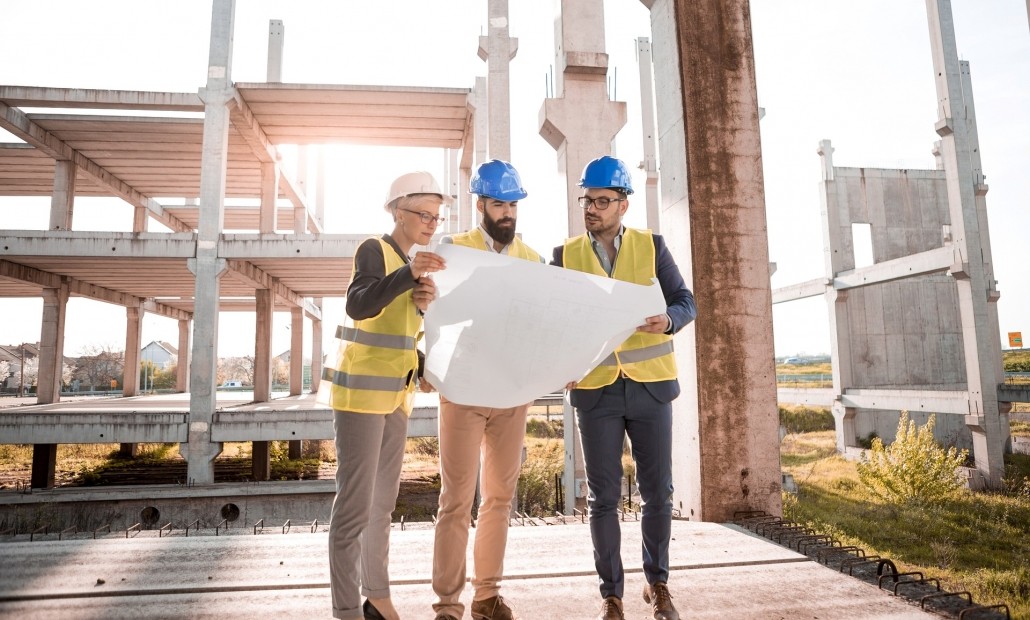HR teams in construction companies place a high priority on safety. HR supports each employee in realizing their potential and making a positive impact on the business.
For more on the responsibilities, challenges, and roles of human resources at a construction company, please see the post below. Tanca also assists you in developing a thorough personnel plan. Let's begin!
Overview

Human resources are not just important for office workers in the construction sector and constructing homes, skyscrapers, and highways.
Every construction project's completion by its managers and employees determines its success, hence the HR department in charge of that workforce plays a crucial role.
However, managing human resources in building projects has some special difficulties. Human resources rules can occasionally be more challenging to implement, monitor, and enforce than in other sectors.
You will now discover the important functions and duties of HR in construction organizations. We'll go through effective HR tactics for construction companies that will assist your business in overcoming typical HR difficulties and gaining a competitive edge.
What is human resources in construction?
In any area, human resources management refers to all the procedures involved in recruiting and supervising employees.
Although there are many fundamental HR functions and responsibilities that are the same in construction and other industries, there are occasionally differences in how human resources performs these roles.
Roles and Responsibilities of HR in Construction Company

Making predictions
Given that construction is frequently project-based, the HR manager's tasks and responsibilities include working with project owner, project managers, subcontractors, and others to define and document each project's roles and responsibilities as well as to detail the end-to-end processes necessary on a project to assess labor demands.
Hiring
HR specialists look for and hire skilled candidates with the required abilities for each project. The skill pool for these positions may be quite small because construction work involves several specialist occupations.
Many significant government-funded projects demand the use of union employees or the payment of union wages to non-union workers.
Training
To accomplish the essential jobs, use the requisite equipment, and satisfy any particular needs of their building projects, personnel must be properly trained and licensed, according to HR departments.
Plans for salaries and benefits
HR assists the company in providing benefits and salaries that are competitive. When it comes to healthcare plans, for instance, HR can do research and make payroll recommendations.
These plans are crucial for construction employees because their livelihood is directly impacted by their health.
Worker protection
Due to the high frequency of accidents and injuries, worker safety is a top priority in the construction industry. HR must ensure that all necessary safety measures are in place at their organization and that employees adhere to them.
Drug test
Drug testing in the construction industry is necessary, but the procedure need not be uncomfortable.
The construction sector is extensively monitored and regulated as a result of the numerous touchpoints that affect both worker and public safety.
Regular drug testing is required in construction by contractual requirements, federal legislation, and more frequently.
According to statistics, drug use is more prevalent in the construction industry than in other industries, with 12 percent of construction employees between the ages of 18 and 49 admitting use in the last 30 days and more than 20 percent reporting use in the last year.
Retention of personnel
A construction company might not be able to achieve its project completion schedule if it loses experienced staff in the middle of the project.
Incentives created by HR can encourage employees to work on a project until it is completed and encourage them to continue working for the company on future initiatives.
Compliance
To keep their companies compliant, HR professionals need to keep up with the many safety standards that are relevant to the construction sector.
Importance of HRM in construction industry

Although the Great Recession-era building boom that had been booming in the United States may have slowed down, there is still a strong need for new development, and there is a huge labor pool in the industry.
According to the U.S. Bureau of Labor Statistics, 11.3 million Americans worked in the construction sector in 2019. That represents more than 3% of the country's population, which is a sizable workforce for construction industry human resources departments to manage.
HR faces a number of obstacles to successfully complete this crucial task, including the following:
Skills Deficit
People with specific skill sets, which are frequently in short supply, are needed in the construction sector.
For instance, businesses could find it challenging to find managerial estimators, construction managers, architects, and support employees who have the training to handle papers specialized to the construction industry.
It can be difficult to find the skilled craftspeople needed to lead project field crews. No wonder, according to a poll conducted by the Associated General Contractors of America, 80 percent of construction firms are having difficulties recruiting experienced labor.
Typically, hiring by construction businesses occurs only after a project contract has been signed. This puts HR professionals under pressure to find the best candidates quickly from a small pool of talent. As they go about their business, they face competition from nearby construction firms for the same skills.
Industry Education
The HR division is in charge of ensuring that the candidates are appropriately trained after selecting the best candidates for the position.
Human resources must identify and manage continuing training requirements, such as equipment skills, work approaches for specific tasks, and certifications, in addition to offering initial training during onboarding.
Additional benefit: these possibilities for development are valued by employees and are vital for the project.
Employee Safety
Worker safety is a continual worry in the construction industry, and it is one of the most important roles and obligations of a human resources management and their staff.
Working in dangerous environments or with potentially lethal equipment is occasionally necessary. A robust training process that places the necessary emphasis on safety is essential to keeping everyone on the job safe.
In addition to being morally good, protecting your employees can help you avoid financial ruin. Businesses that fail to take crucial safety procedures run the danger of incurring exorbitant costs. Workplace accidents may result in both direct and indirect costs, such as:
- Medical costs.
- increasing costs for workers' compensation insurance.
- Lost output while a worker recovers from an injury.
- The price of hiring and preparing replacement employees.
- The potential for injury victims to file legal claims.
- Reputational harm to the building company.
Retention of Employees and Independent Contractors
Keeping the competent personnel you do hire is crucial due to the difficulty in obtaining qualified construction workers due to a small talent pool and a skills deficit.
Unfortunately, employee as well as independent consultant retention can be a bigger difficulty for HR than in other industries because employment in the construction industry typically happens project by project.
For instance, a skilled worker may decide to take on employment contracts for projects from several different organizations in succession rather than commit to working for one employer for a long period of time.
The construction sector experienced a turnover rate of 21.4% in 2017. In the construction industry, one in five workers change employment.
Various Workforce
The workforce's propensity for great diversity in the construction industry presents another issue for human resource management.
A project can initially bring together people in a wide range of diverse positions, from less-skilled employees to highly specialized specialists and administrative staff.
Additionally, hiring managers in the construction industry frequently use workers from other nations or diverse ethnic backgrounds, so HR must be prepared to handle linguistic and cultural differences. Age is another factor to consider, as older and younger workers frequently have different perspectives on their professions and careers.
Because of the variety of work functions, demographics, and life experiences, HR departments must employ various strategies while looking for new hires and carrying out onboarding and training.
Legal Observance
As a result of the construction industry's intense regulation, HR must constantly be aware of both basic employment laws and a wide range of industry-specific rules and standards. Companies must, for instance, abide by labor laws such as the Fair Labor Standards Act, the Affordable Care Act, OSHA rules, and union contracts.
Additionally, HR departments must ensure that their company abides by all applicable immigration regulations for international personnel.
As immigration legislation is frequently complex and susceptible to change, this increases complexity.
Employers may incur substantial expenditures as a result of adhering to these laws and regulations, but failing to do so could result in much higher costs due to the potential for severe penalties and litigation.
Challenges of human resource management in construction industry

Recognizing the Construction Sector
Unaware of the difficulties experienced by field employees, an HR expert who is new to the construction industry may find it challenging to make changes and develop regulations.
Understanding the difficulties and methods faced by field workers can help you develop fresh perspectives. You can also get a sense of the direction the firm is taking by conducting a SWOT analysis (Strengths, Weaknesses, Opportunities, and Threats). This will show you what's working, what isn't, and how you might contribute.
Getting Line Management's Support
You can start developing strategy and process improvements if you have a solid understanding of the sector and business you work for.
Try providing meaningful answers to the problems line management, construction managers, and foreman encounter rather than attempting to enforce policies on them.
This is made possible by modifying existing regulations or introducing new ones in a way that addresses the issues they are now facing in the field.
Amount Spent on Turnover
Construction turnover is extremely expensive. When employees change employment after a project is completed, for instance, this occurs. Increased unemployment taxes are the outcome of layoffs at the conclusion of projects (SUTA and FUTA).
Of course, the significant costs associated with hiring and training new staff in any company also apply.
Manage Temporary Employees
Because some workers in the construction sector are independent contractors, it can be challenging for businesses to retain employees for extended periods of time. People will change jobs if it is financially advantageous to do so, moving from one project or business to another.
Financially speaking, hiring contractors can also be beneficial to the business, but it takes more preparation. Establishing a reliable hiring procedure will be necessary.
Temporary worker employers must also have effective training programs in place for new hires so that they may learn the expectations of them right away.
Choosing Unions
Joining a union has many advantages for construction employees, including the ability to collectively bargain for improved wages, benefits, and working conditions.
A recent survey from the Bureau of Labor Statistics found that in 2021, 12.6% of those employed in the construction business were union members. The survey also demonstrates that union members typically earn higher wages.
Working with unions may be challenging, particularly when employee complaints and collective bargaining are involved. By honing their bargaining and communication skills and attempting to understand things from the employees' point of view, HR can get around this.
Human Resources Plans for a Construction Company Guide

Although HR departments in the construction industry face many difficulties, HR specialists may significantly improve the environment at work for both employees and their bosses.
Using HR best practices adapted to the needs of the construction industry, such the ones listed below, can help HR overcome some of its difficulties.
Recruitment and Hiring
Utilize the Most Powerful Channels to Find Talent
The requirements for construction projects are as varied as the manpower required to complete them. Utilize many platforms to connect with various worker kinds rather than employing a one-size-fits-all strategy to identify ideal applicants.
You should use different recruiting strategies for project managers and civil engineers than you would for less qualified individuals. For instance, posting job descriptions on social media may be the most effective approach to reach out to younger employees.
Make Your Package Competitive
Start by providing each team member with a detailed job description so that qualified candidates can quickly determine whether they are a good fit.
Then, provide rewarding bonuses or incentives, a secure and appealing work environment, competitive compensation and benefits, as well as continual training and development.
Paid time off, excellent health insurance, 401(k) plan participation, and non-traditional advantages like gym membership may all be desirable features that make your remuneration package stand out. Remember that employers will shop around for skilled construction employees since they are in high demand.
Training and development in construction industry
Implement a Thorough Onboarding Procedure
According to statistics, construction workers who are newly hired sustain work-related injuries more frequently than any other category of employees.
Onboarding new hires should entail complete job training with a proper emphasis on safety, according to HR pros. New employees should be taught to identify dangers on the job site and to be ready for any risks they may face.
Onboarding doesn't start and stop on the first day for new recruits in order to support their success. For the first six months, conduct regular check-ins at least on a monthly basis to help you make sure that staff members are still receiving the training and tools they need to perform their jobs safely and effectively.
Make a policy for ongoing training
Training should start on the first day for a new employee and should continue to be a developing component of their career for as long as they are a member of your team.
Workers of today seek career development options that will help them explore other career pathways, improve their skill set, and become more qualified for promotions in addition to improving their talents in their current position.
A strong training strategy can help firms close the skills gap, manage risk better, and retain more employees.
Employee Safety
Create extensive safety plans
HR must take the initiative to ensure that safety protocols are in place and carefully adhered to more than anybody else in construction organizations.
Develop a thorough safety strategy with management, and secure support for its implementation. To prevent or reduce safety hazards, your company's safety plan should contain regular employee training as well as specific procedures for accidents or injuries.
Additionally, HR managers must ensure that all employees, including those who do not speak English, can understand safety instructions.
Insist on the Value of Healthcare
Because they work in potentially hazardous conditions, many construction workers are very concerned about their health.
Human resources departments should ensure that staff members are aware of their health benefits and exhort them to never disregard symptoms of illness or injury.
Additionally, educate your staff on the need of using their healthcare benefits frequently and how to maximize their coverage. For instance, your coverage might cover routine checkups or offer incentives for giving up smoking or gaining weight.
Retention
Institutional Communication Channels
People are more inclined to stick with companies where they feel that their voice is valued and heard when they voice a problem.
HR should aim to foster an environment where workers feel at ease discussing job-related difficulties. This open environment supports managers in identifying possible issues and resolving them before they worsen.
Create avenues of communication, meetings or a straightforward suggestion box, where staff members can express issues without fear of retaliation.
A wonderful method to learn about each employee's experience at work and to hear any issues or queries they may have is to check in with them frequently.
Whatever steps you take, make sure to enlist the help of bilingual employees who can provide translation services for non-English speakers.
Create a mentoring program
A mentorship program may be a very effective strategy for keeping construction workers. Veteran workers can pass on their expertise by mentoring new hires and training them on the job.
This assists new employees in becoming acquainted with the building site and corporate culture, creates employee connections, and guarantees that vital knowledge is shared from one worker to another while satisfying the new hire's need for advancement. All of these advantages can persuade potential workers that working with your company is a wise decision for the long term.
Frequently Asked Questions
Why is HR important in construction?
In the construction industry, human resource management (HRM) largely concentrates on ensuring that a project has enough human resources with the necessary backgrounds and expertise to be completed successfully.
How does manpower planning works in construction industry?
This entails routinely evaluating the organization‘s resources, projecting future hiring needs, making sure that the supply of competent workers and laborers matches the demand for projects as well as the inverse—making sure that the supply of tasks meets the need for your workforce.
Wrap up
All in all, the most significant resource in the construction company is its workforce. In the top construction companies, the wellbeing of its workforce is at the center of HR's functions and responsibilities.
HR supports each employee in realizing their potential and making a positive impact on the business. The greatest method for your HR team to help your firm become renowned as a place in which the best people prefer to work is to follow best practices for attracting, developing, rewarding, and retaining competent personnel.
You can use Human Resource Management Software to save your time tracking and management. If you are a newbie, don't forget to look at the beginners' guide to human resources.









